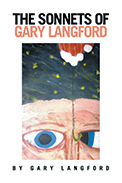
 |
We are small children in love with the earth's foot.
Knowledge is drought. We are willfully trodden on."
In an age where new is frequently seen as better, Langford proves that poetry is often more powerful in the hands of a proven master. The author has been developing his craft for decades, chipping away at the encroaching verbiage to distill his sonnets into pieces where every word has a purpose. The result is a fantastic collection of poems: some gleaned from his earlier books or his CD of performance poetry, others freshly minted for this book. But all of them exhibit the polish and precision of a veteran wordsmith.
Like most modern writers of sonnets, Langford feels the freedom to ignore the restrictions of the Shakespearean and Petrarchan styles and instead keeps only to the traditional fourteen lines of the form. But that relatively short length becomes the perfect sandbox for Langford's imagination. For example, tucked away among the serious poems there is "Pig Talk," a series of seven linked sonnets tracking the life of an introspective porker from piglet to market-ready. Despite the use of a non-human narrator, the poems, which at first glance could seem tongue-in-cheek, instead come across as strangely moving and reminiscent of the moody yet more political verse of Pink Floyd's Animals. Other sonnets in this section sometimes paint a bleak portrait of humanity, from the vulgar, drunken subject of "A Dirty Woman" who would rather live offensively than cry over her situation to the trapped son of an uncaring and verbally abusive father in "Son Net." Yet Langford also enjoys employing a lighter, even silly touch at times, and the latter section is filled with his more comical verse.
Anyone can string fourteen lines of something resembling iambic pentameter together and call it a modern sonnet. However, it takes the touch of a master such as Langford to bring the form to new heights.
RECOMMENDED by the US Review